大学英语翻译教程-第六讲
英汉翻译教程unit6
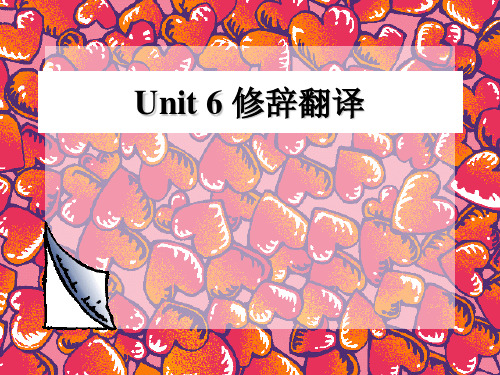
• 11. Thunder roared and a pouring rain started. • 试翻译:雷声怒吼中开始下起了倾盆大雨。(拟人) 试翻译:雷声怒吼中开始下起了倾盆大雨。(拟人) 。(拟人 • 12. It took a few dollars to build this indoor swimming pool. • 试翻译: 建一个室内游泳池只花几美元。(夸张) 。(夸张 试翻译: 建一个室内游泳池只花几美元。(夸张) • 13. To tell you the truth, I was really scared to death at that time. • 试翻译:说真的,我那时真是吓得要死。(夸张) 试翻译:说真的,我那时真是吓得要死。(夸张) 。(夸张 • 14. His words made my blood freeze. • 试翻译:听了他的话,我的血都快凝固了。(夸张) 试翻译:听了他的话,我的血都快凝固了。(夸张) 。(夸张 • 15. He threw a nervous glance at his brother. • 试翻译:他紧张地朝他的兄弟瞥了一眼。(移就) 试翻译:他紧张地朝他的兄弟瞥了一眼。(移就) 。(移就
• "You're giving me a pain in the neck," shouted Dr. Ruby, "Do you have a chip on my shoulder or something? Just laugh!" • 你是不是成心找不愉快 成心找不愉快? 成心找不愉快 • "I don't have a chip on my shoulder. Nothing is broken. I told you I have a sore throat and a pain in my knee." • "My knee only hurts when dance," said the doctor. "That's because I have two left feet." • 那是因为我笨手笨脚 笨手笨脚。" 笨手笨脚
新英汉翻译课件教程 Chapter 6 词义的处理
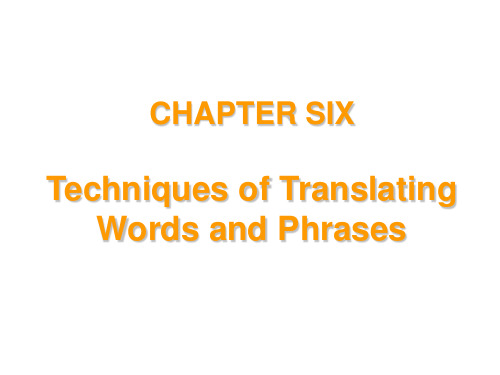
• 6. Although our country is economically better off than ever before, it has a way to go. • A.虽然我国的经济比以前有所前进,今后仍有很长的路要 走。 • B. 尽管我国的经济情况比以前有所好转,但仍有待进一 步发展。 • 。 • 7. These brightly colored stockings are all the go this summer. • A.这种色彩鲜艳的长筒女袜,只一个夏天就穿破了。 • B.这种色彩鲜艳的长筒女袜,今年夏天很流行。 • 8. The cooking was up to the hammer. • A.把饭倒在锤子上了。 • B.烹调是第一流的。
• 9. Everything was working very smoothly and I felt on top of the world. • A.一切进展顺利,我感到在世界顶端。 • B.一切进展顺利,我感到满意极了。 • 10. There is no provocation for such an angry letter. • A.没有理由写这样一封怒气冲冲的信。 • B.别写这样一封使人生气的信。 • C.不必对这样一封令人气愤的信而发火。
• 例3:She has given heart to him.
• 【误】她爱上了他。 • 【正】她鼓励了他。 • 【解析】“give heart to sb.” 意思是 “鼓励某人”,不 是“把心都给了某人”; “give one’s heart to sb.” 才 是 “爱上某人”。象这类词组还有 “give sb. a hand” “帮助某人”,而“give one’s hand to sb.” 便成了“同 意嫁给某人”;“serve time” “服刑”,而“serve one’s time”则为“处于学徒期”;“watch time” 意思 是“不要迟到”,而“watch one’s time” 则是“等待时 机”。要克服这方面的错误,必须加强语言修养,对词汇、 语法、惯用法等要细心研究,多琢磨思考。
大学翻译理论与实践ppt课件 第六章
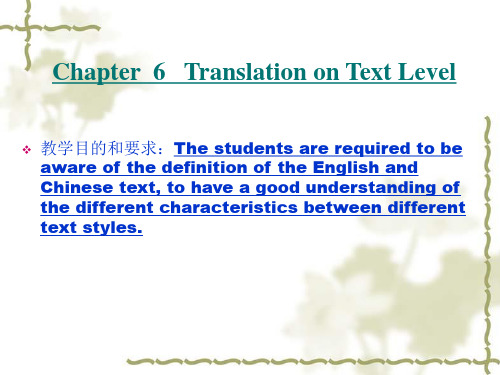
师生互动之翻译擂台: 详情请登录徐州工程学院网络课程网站—— 翻译理论与实践——韩素音青年翻译大赛
Lecture Two (2 periods)
重难点:应用文体的特点及其翻译 3.1公文的文体特点及翻译(15minutes) 3.2 商贸函电的文体特点及翻译(25minutes) 3.3 广告英语的文体特点及翻译(45minutes)
对于人们给予我的赞扬,我也想做出同样的 回报:借此国际学界的最高盛会,请业已同 样艰苦劳作的青年男女听我说几句话,因为 在他们中间,将来站在我现在所站的讲台上 的人已经产生了。(廖国强 英汉互译理论、 技巧与实践 国防工业出版社 2006/89)
汉语的螺旋式是以“起、承、转、合”为特 点的,它先宣称主题之重要,然后展开反复 的论述,最后回归到主题并对它再三强调。 其根本特征就是重复,乃至不厌其烦的强调, 即词语和结构的复现与叠加。
When it came out in a newspaper interview that I said Nixon should resign, that he was a crook, oh dear, that fur flew. (Studs Terke, American Dream)
3.1.1 公文的文体特点
1) 措词准确。 2) 用词正式,且多古体词。 3) 普通词多有特定意义。如allowance一词 通常指"允许"、"津贴",而在经贸合同中则多 指"折扣". 4) 长句、复杂句较多。
3.1.2 公文的翻译
翻译公文首先要注意公文特有的形式,包括格式、 体例等。对已模式化、程式化的格式译者决不应随 便更改。其次,译者应透彻理解原文,特别是要正 确把握原文词义,认清一些common words在公文 中特有的含义。再次,在措词上必须使译文的语体 与原文相适应。一般说来,英语公文翻译通常应使 用正式书面语体,并酌情使用某些文言连词或虚词。 最后,公文翻译中要注意长句的处理。要在理清句 意和各部分之间逻辑关系的前提下恰当使用切分法 或语序调整法,以使译文通畅、自然、地道。
大学英语unit6原文与翻译
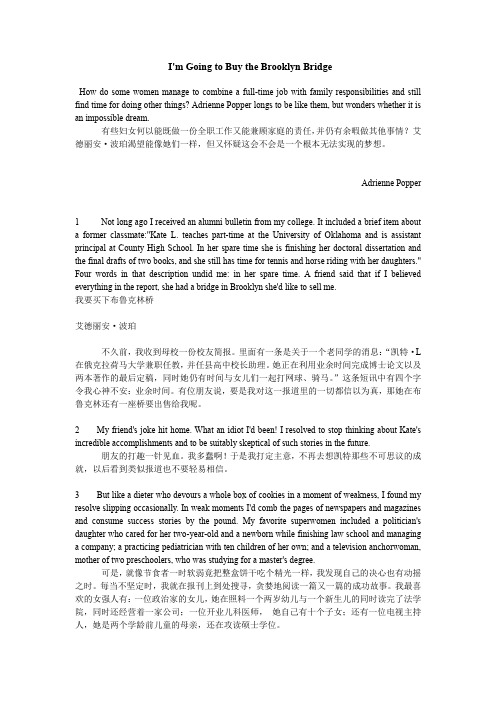
I'm Going to Buy the Brooklyn BridgeHow do some women manage to combine a full-time job with family responsibilities and still find time for doing other things? Adrienne Popper longs to be like them, but wonders whether it is an impossible dream.有些妇女何以能既做一份全职工作又能兼顾家庭的责任,并仍有余暇做其他事情?艾德丽安·波珀渴望能像她们一样,但又怀疑这会不会是一个根本无法实现的梦想。
Adrienne Popper1 Not long ago I received an alumni bulletin from my college. It included a brief item abouta former classmate:"Kate L. teaches part-time at the University of Oklahoma and is assistant principal at County High School. In her spare time she is finishing her doctoral dissertation and the final drafts of two books, and she still has time for tennis and horse riding with her daughters." Four words in that description undid me: in her spare time. A friend said that if I believed everything in the report, she had a bridge in Brooklyn she'd like to sell me.我要买下布鲁克林桥艾德丽安·波珀不久前,我收到母校一份校友简报。
英汉翻译第6章(増译和减译)PPT教学课件

2020/12/10
8
❖ (二)增加形容词
❖ The plane twisted under me, trailing flame and smoke.
❖ (敌人的)飞机在下面螺旋下降,拖着浓烟烈焰掉 了下去。
❖ With what enthusiasm the Chinese people are building socialism.
impartial judge in Chinese history). ❖ 对毕业生采取双向选择制度。
❖ The two-way choice system can be adopted for college graduates, which means that graduates could choose employers and employers could choose graduates.
❖ 三个臭皮匠,顶一个诸葛亮
❖ Three cobblers with their wits combined equal to Zhu Geliang the master mind
❖ 班门弄斧
❖ Show off one’s proficiency with the axe before Lu Ban the master carpenter.
❖ First you borrow, then you beg. ❖ 头一遭借钱,下一遭就讨饭。
2020/12/10
10
❖ 2. 在形容词前增加名词
❖ He is a complicated man – moody mercurial, with a melancholy streak.
大学跨文化英语 综合教程I Unit 6 Making Sense of China课文翻译
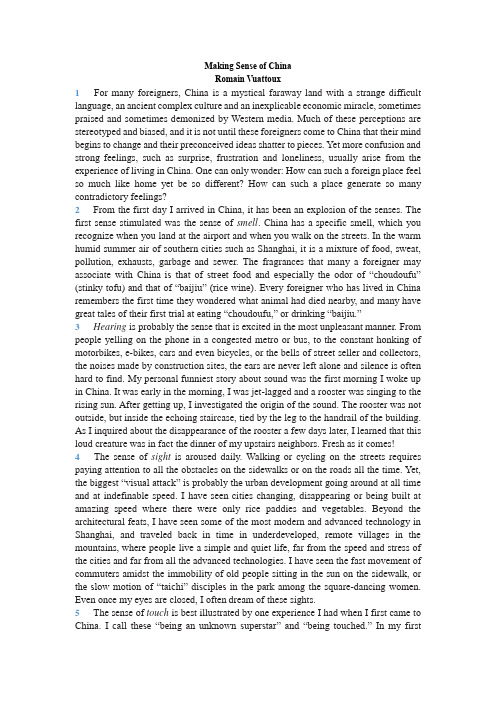
Making Sense of ChinaRomain Vuattoux1 For many foreigners, China is a mystical faraway land with a strange difficult language, an ancient complex culture and an inexplicable economic miracle, sometimes praised and sometimes demonized by Western media.Much of these perceptions are stereotyped and biased, and it is not until these foreigners come to China that their mind begins to change and their preconceived ideas shatter to pieces. Yet more confusion and strong feelings, such as surprise, frustration and loneliness, usually arise from the experience of living in China. One can only wonder: How can such a foreign place feel so much like home yet be so diff erent? How can such a place generate so many contradictory feelings?2 From the first day I arrived in China, it has been an explosion of the senses. The first sense stimulated was the sense of smell. China has a specific smell, which you recognize when you land at the airport and when you walk on the streets. In the warm humid summer air of southern cities such as Shanghai, it is a mixture of food, sweat, pollution, exhausts, garbage and sewer. The fragrances that many a foreigner may associate with China is that of street food and especially the odor of “choudoufu” (stinky tofu)and that of “baijiu” (rice wine). Every foreigner who has lived in China remembers the first time they wondered what animal had died nearby, and many have great tales of their fi rst trial at eating “choudoufu,” or drinking“baijiu.”3 Hearing is probably the sense that is excited in the most unpleasant manner. From people yelling on the phone in a congested metro or bus, to the constant honking of motorbikes, e-bikes, cars and even bicycles, or the bells of street seller and collectors, the noises made by construction sites,the ears are never left alone and silence is often hard to find. My personal funniest story about sound was the first morning I woke up in China. It was early in the morning, I was jet-lagged and a rooster was singing to the rising sun. After getting up, I investigated the origin of the sound. The rooster was not outside, but inside the echoing staircase, tied by the leg to the handrail of the building. As I inquired about the disappearance of the rooster a few days later, I learned that this loud creature was in fact the dinner of my upstairs neighbors. Fresh as it comes!4 The sense of sight is aroused daily. Walking or cycling on the streets requires paying attention to all the obstacles on the sidewalks or on the roads all the time. Yet, the bigge st “visual attack” is probably the urban development going around at all time and at indefinable speed. I have seen cities changing, disappearing or being built at amazing speed where there were only rice paddies and vegetables. Beyond the architectural feats, I have seen some of the most modern and advanced technology in Shanghai, and traveled back in time in underdeveloped, remote villages in the mountains,where people live a simple and quiet life, far from the speed and stress of the cities and far from all the advanced technologies. I have seen the fast movement of commuters amidst the immobility of old people sitting in the sun on the sidewalk, or the slow motion of “taichi” disciples in the park among the square-dancing women. Even once my eyes are closed, I often dream of these sights.5 The sense of touch is best illustrated by one experience I had when I first came to China. I call these “being an unknown superstar” and “being touched.” In my f irsteducational establishment, I sometimes had to teach in another campus on the other side of town. I would ride my bicycle across town to get to class, and it often felt like being in a movie. All the kids and adults stared and pointed to the “laowai” (foreigner) on his bicycle. As I took an excursion in the “deep” countryside, many people would approach me while I was buying some water or some snack and would start touching the hair on my arms.6 For foreigners as for Chinese, the most important sense is the sense of taste. It is also certainly the one that provides the most pleasure and the base of many relationships.I have been invited to many meals and took part in ceremonial drinking. I have seen food displays that are as elaborate as their tastes. Thousand-year-old eggs, snake, turtle, dumplings, bamboo,lotus root, pigs ears, lacquered ducks, duck neck and head, chicken feet,spicy fish head, the hundreds of ways of eating tofu are just some of the dishes that one discovers and appreciates. A lifetime would never suffice to try to taste all the specialties in China.7 Orderly chaos, disorganized order, old and new, beautiful and filthy,clean and dirty, rich and poor, kindness and arrogance ... All are opposed sensations and situations living together, side by side. For me, China is a collision of feelings, a juxtaposition of experiences and perceptions that are usually contradictory. China is all these contradictions and diversity that somehow manage to live together almost harmoniously.参考译文解读中国罗曼·瓦图对于很多外国人而言,中国是一个遥远而神秘的国度,有着奇特难懂的语言,古老深奥的文化,以及难以解释的经济奇迹,时而被西方媒体戴高帽,时而被他们妖魔化。
新视野大学英语6 课文英汉对照翻译
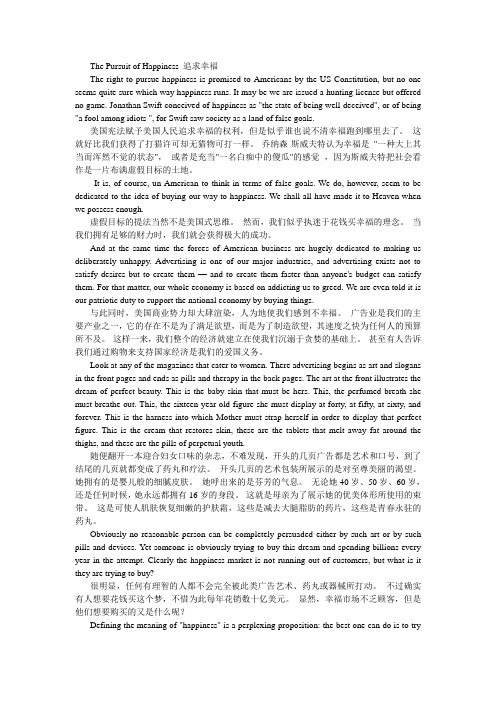
The Pursuit of Happiness 追求幸福The right to pursue happiness is promised to Americans by the US Constitution, but no one seems quite sure which way happiness runs. It may be we are issued a hunting license but offered no game. Jonathan Swift conceived of happiness as "the state of being well-deceived", or of being "a fool among idiots ", for Swift saw society as a land of false goals.美国宪法赋予美国人民追求幸福的权利,但是似乎谁也说不清幸福跑到哪里去了。
这就好比我们获得了打猎许可却无猎物可打一样。
乔纳森·斯威夫特认为幸福是"一种大上其当而浑然不觉的状态",或者是充当"一名白痴中的傻瓜"的感觉,因为斯威夫特把社会看作是一片布满虚假目标的土地。
It is, of course, un-American to think in terms of false goals. We do, however, seem to be dedicated to the idea of buying our way to happiness. We shall all have made it to Heaven when we possess enough.虚假目标的提法当然不是美国式思维。
然而,我们似乎执迷于花钱买幸福的理念。
当我们拥有足够的财力时,我们就会获得极大的成功。
翻译教程第六次课
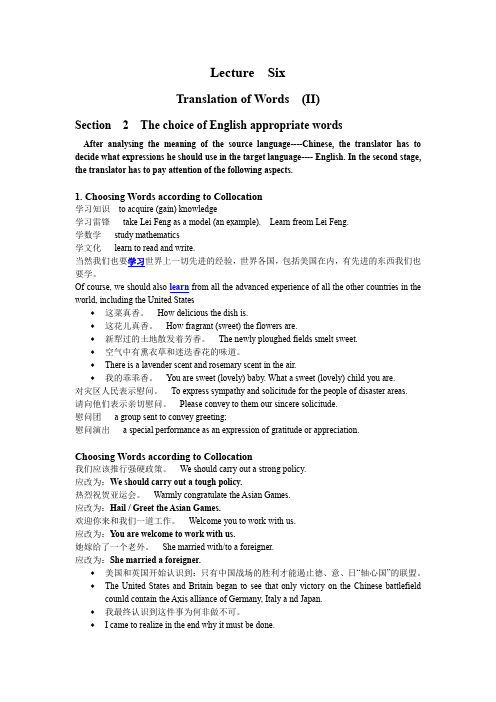
Lecture SixTranslation of Words (II)Section 2 The choice of English appropriate wordsAfter analysing the meaning of the source language----Chinese, the translator has to decide what expressions he should use in the target language---- English. In the second stage, the translator has to pay attention of the following aspects.1. Choosing Words according to Collocation学习知识to acquire (gain) knowledge学习雷锋take Lei Feng as a model (an example). Learn freom Lei Feng.学数学study mathematics学文化learn to read and write.当然我们也要学习世界上一切先进的经验,世界各国,包括美国在内,有先进的东西我们也要学。
Of course, we should also learn from all the advanced experience of all the other countries in the world, including the United States♦这菜真香。
How delicious the dish is.♦这花儿真香。
How fragrant (sweet) the flowers are.♦新犁过的土地散发着芳香。
The newly ploughed fields smelt sweet.♦空气中有熏衣草和迷迭香花的味道。
- 1、下载文档前请自行甄别文档内容的完整性,平台不提供额外的编辑、内容补充、找答案等附加服务。
- 2、"仅部分预览"的文档,不可在线预览部分如存在完整性等问题,可反馈申请退款(可完整预览的文档不适用该条件!)。
- 3、如文档侵犯您的权益,请联系客服反馈,我们会尽快为您处理(人工客服工作时间:9:00-18:30)。
6.1.1 名词转译成动词
其他名词转译成动词 英语中有些名词尽管不具有明显的动作含义,但 有时转译成汉语动词不仅有效地保持了原意,而 且能使译文更加自然通顺。 (32) A fire in the neighbor’s house can easily bring disaster to everyone. (33) Differences between the social systems of states shall not be an obstacle to their contact and cooperation.
6.1.1 名词转译成动词
动名词和由动词派生的名词往往转译成动词
(12) No other changes occur upon mixing the two compounds (13) In handling the materials of history, each act of selection is also an act of judgment. (14) The engine has given a constantly good performance. (15) Military bases are a serious obstacle to the achievement of independence by the colonial people.
6.1.1 名词转译成动词
6.1.1 名词转译成动词 英语中许多含有动作意义的名词和由动词派生 的名词以及其他一些名词经常可以转译成汉语 的动词。
具有动作含义的名词转译成动词 (6) He was accused of neglect of his duties. (7) The sight and sound of our jet planes filled me with special longing.
6.1.2 介词(与介词短语)转译成动词
此外,英语中不少的短语介词同样具有动作、 行为意义,这些短语介词汉译时,也往往转换 成动词。 (42) Before long his thoughts were centred on the use of air as the working fluid, instead of steam. (43) In view of human history this could be a slight enough hope.
.2 介词(与介词短语)转译成动词
(44) The work at the weather observation stations goes on regularly without any interruption, in spite of any weather conditions.
LOGO
第 六 讲 翻译技巧(二): 词类转换
Contents
6.1. 转换成汉语动词 6.2. 转换成汉语名词
6.3. 转换成汉语形容词
6.4. 转换成汉语副词
在忠实于原文的前提下,根据译入语的行文习 惯,适当进行词类转换(即将原文中属于某种 词类的词译成译语的另一类词),能使译文通 顺达意、自然流畅。
6.1.1 名词转译成动词
(22) I am afraid I cannot teach you to operate the machine, but Tom will be a good teacher for you. (23) The computer is a far more careful and industrious inspector than human beings. (24) The economic environment is characterized by buyers, sellers and competitors. (25) Talking with his young neighbor, the old man was the forgiver of the young man’s past wrong doings.
(1) Those small factories are also lavish consumers, and wasters, of raw materials. 原译:那些小厂还是原材料极大的消耗者和浪费 者。 (2) My clothes are a witness to my poverty. 原译:我的衣服是我贫穷的目击者。
6.1.1 名词转译成动词
在习语化短语动词中作中心词的名词往往转 译成动词 英语中有大量习语化的短语动词,其中心词是 名词,译成汉语时,一般可以转换成动词。 (26) The lecturer gave an excellent picture of the living conditions in Africa. (27) Anyone who has had a look at an old radio set will remember the large, heavy vacuum tubes and other components.
词类转换是英汉翻译中不可或缺的变通手段, 是突破原文词性束缚、避免貌合神离的硬译死 译,使译文准确、通顺、易懂的有效方法。 并不意味着词类转换可以随心所欲,而必须遵 循忠实于原文意义、使译文自然流畅、通顺易 懂的原则。
6.1 转换成汉语动词
英语动词远比汉语动词用得少。一个英语句子 (单句)往往只用一个限定性动词作谓语,而 在一个汉语句子中却可以出现几个动词。 (5) For 20 years we were passive witnesses to the deterioration of prices of our raw materials and an excessive increase of the prices of manufactured goods. 我们在二十年中坐视原材料价格下跌与工业品 价格暴涨。
6.1.2 介词(与介词短语)转译成动词
英语中介词与(及物)动词在句法特征上具有 共性,即两者都可以带宾语。实际上,不少介 词就是由动词演变而来的,并且仍带有明显的 动作含义;还有一些介词虽不直接源于动词, 在一定的上下文中同样具有动词意义。这些经 常带有动作意味的介词,翻译时宜根据具体情 况转换为汉语动词。
6.1.1 名词转译成动词
(28) A baby has no knowledge of good and evil. (29) He made no mention of your suggestion at the meeting. (30) Take a taste of the newly produced watermelon. (31) Tom took a final look at his lovely hometown.
6.1.1 名词转译成动词
由动词加后缀 -er或 -or构成的名词转译动词 英语中有些带后缀 -er或-or的名词, 有时在句中 并不用来指某人的身份或职业,而是带有较强的 动作含义,一般宜转译为汉语动词。 (19) Some of my classmates are good singers. (20) That well-known scientist was a great lover of literature when he was a child. (21) He was a voracious reader, spending much of his days and evenings devouring books.
(45) Metals can be welded by means of heat produced by a current.
6.1.3 形容词转换成动词
英语形容词不少可以转译成动词。这种形容词 大体包括两类:一类主要是由动词派生(或转 换)而来,大多能引申出动作意义;另一类多 用于表示各种心理状态,而这些心理状态在汉 语中一般则用动词表达。
(34) They taught us the value of a dollar, took us to church, made us mind. (35) Such events as the murder of Lumumba are clear examples of the colonialists’ cruelty.
6.1.2 介词(与介词短语)转译成动词
(36) The moon turns around the earth and the earth revolves around the sun. (37) “Coming!” Away she skimmed over the lawn, up the path, up the steps, across the veranda, and into the porch. (38) He has intelligence beyond the ordinary.
词类转换不啻能使译文自然流畅、纯正地道,而 且有时是翻译得以进行所必须采用的手法。 (3) Mercury weighs about thirteen times as much as water. 水银的比重是水的十三倍。 (4) The new computer features high efficiency, great reliability and low cost. 新型计算机的特点是效率高、可靠性强、成本低 廉。
6.1.2 介词(与介词短语)转译成动词
(39) Are you for or against the proposal?
(40) She has gained her master’s degree from Harvard’s School of Education and is finally off welfare. (41) This is a picture after Picasso.
